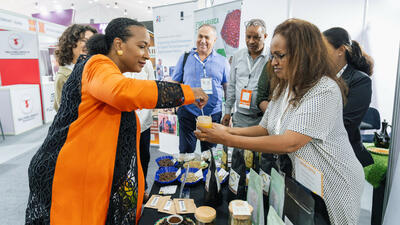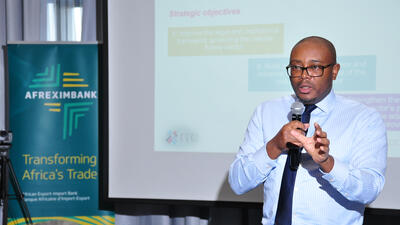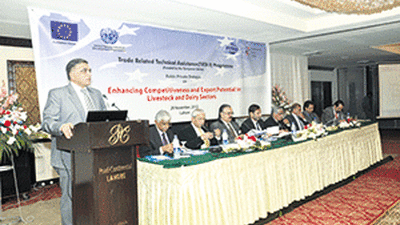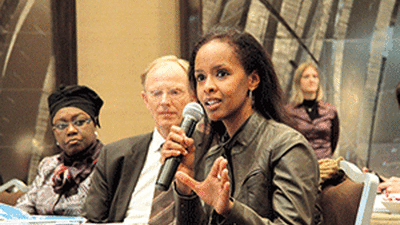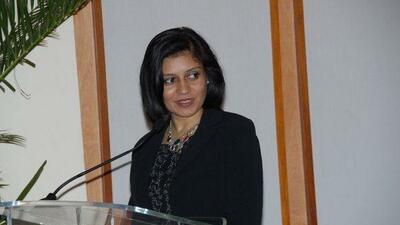Trade Forum Features
The EBRD extends a helping hand
15 April 2013
How the EBRD helps drive sustainable growth and structural reform in a bid to unlock the potential of Arab economies and boost job creation
The European Bank for Reconstruction and Development (EBRD) is a successful international financial institution with unparalleled experience helping countries in transition develop vibrant market economies and deliver growth. On the basis of the bank’s track record, its shareholders want it to support the changes that are under way in much of the Arab world. The Arab Spring and its aftermath differ in many ways from the collapse of communism in Europe, the catalyst that led to the creation of the EBRD in 1991. But the challenges faced then by Central and Eastern Europe – and now by many Arab states – have more than enough in common for our expertise to be in demand.
Working with the EBRD, Arab economies can unlock substantial amounts of capital for investment in their future. Funding from the bank could, depending on demand and market conditions, be as much as €2.5 billion each year by 2015, and the overall sum is likely to be much higher. For every euro that the bank invests in areas such as credit lines for small- and medium-sized enterprises (SMEs), its trade facilitation programme and energy efficiency projects, it typically attracts another €2.5 from the private sector.
On policy and structural reform, we advise on the banking system, price liberalization, privatization, infrastructure regulation and legal frameworks to underpin the financial and private sectors. Progress in these activities is crucial for the countries where we are already active and investing, namely Egypt, Jordan, Morocco and Tunisia, not least because it is vital to the success of the countries’ private sectors and, in particular, their SMEs. In economies that have been burdened by significant state control and intervention for too long, it is SMEs that have the greatest potential to generate growth, drive innovation and create lasting jobs.
Lowering the high rates of unemployment in the four additional countries where the EBRD is now working, as well as in countries where the bank has operated for many years, is a matter of urgency. The statistics are stark. In Jordan and Tunisia, for example, youth unemployment is around 30%. Egypt needs its economy to grow by between 6% and 7% every year merely to ensure that the numbers of jobless people do not rise.
Every man or woman who wants to work but cannot find a job has his or her own sad story to tell. But there is particular poignancy in the fact that, in many of these countries, it is the best educated who are the most likely to be unemployed. Put simply, the men and women with the most to contribute are being failed by economies that are unable to create the skilled and productive jobs their countries need most of all. Needless to say, this state of affairs does not bode well for the future, but we believe that countries such as Egypt, Jordan, Morocco or Tunisia are not doomed to suffer high levels of unemployment forever. Jobs can be created and all the evidence points to the private sector as the most efficient source of new jobs. According to the International Finance Corporation, the sector produces nine out of 10 new jobs globally.
Together with our four new partners, there is much that we can do to improve the prospects of these countries as a whole, as well as those of their SMEs and the jobless. The bank can work to boost the overall investment climate and infrastructure, and it can help remove barriers to trade both within the region and beyond.
We can also start to overhaul financial sectors to provide SMEs with better access to credit to expand their businesses. Now, only between 5% and 7% of SMEs have access to loans or credit lines, a percentage that is lower than in the bank’s traditional region of activity in Eastern Europe, where 20 years ago SMEs hardly existed.
In Egypt, Jordan, Morocco and Tunisia, we are already on the ground providing technical assistance to SMEs, particularly women entrepreneurs, through our Enterprise Growth Programme and business advisory services.
When the EBRD began its support for former communist countries in their transition to become market economies, unemployment was not initially a major concern. But driving sustainable growth, structural reform, de-monopolization and privatization were then, and continue to be, very much what we excel at.
A major challenge awaits us, but we are nevertheless ready and excited to be extending our mission to a new region and to help its citizens seize fresh opportunities and forge new futures.
Working with the EBRD, Arab economies can unlock substantial amounts of capital for investment in their future. Funding from the bank could, depending on demand and market conditions, be as much as €2.5 billion each year by 2015, and the overall sum is likely to be much higher. For every euro that the bank invests in areas such as credit lines for small- and medium-sized enterprises (SMEs), its trade facilitation programme and energy efficiency projects, it typically attracts another €2.5 from the private sector.
On policy and structural reform, we advise on the banking system, price liberalization, privatization, infrastructure regulation and legal frameworks to underpin the financial and private sectors. Progress in these activities is crucial for the countries where we are already active and investing, namely Egypt, Jordan, Morocco and Tunisia, not least because it is vital to the success of the countries’ private sectors and, in particular, their SMEs. In economies that have been burdened by significant state control and intervention for too long, it is SMEs that have the greatest potential to generate growth, drive innovation and create lasting jobs.
Lowering the high rates of unemployment in the four additional countries where the EBRD is now working, as well as in countries where the bank has operated for many years, is a matter of urgency. The statistics are stark. In Jordan and Tunisia, for example, youth unemployment is around 30%. Egypt needs its economy to grow by between 6% and 7% every year merely to ensure that the numbers of jobless people do not rise.
Every man or woman who wants to work but cannot find a job has his or her own sad story to tell. But there is particular poignancy in the fact that, in many of these countries, it is the best educated who are the most likely to be unemployed. Put simply, the men and women with the most to contribute are being failed by economies that are unable to create the skilled and productive jobs their countries need most of all. Needless to say, this state of affairs does not bode well for the future, but we believe that countries such as Egypt, Jordan, Morocco or Tunisia are not doomed to suffer high levels of unemployment forever. Jobs can be created and all the evidence points to the private sector as the most efficient source of new jobs. According to the International Finance Corporation, the sector produces nine out of 10 new jobs globally.
Together with our four new partners, there is much that we can do to improve the prospects of these countries as a whole, as well as those of their SMEs and the jobless. The bank can work to boost the overall investment climate and infrastructure, and it can help remove barriers to trade both within the region and beyond.
We can also start to overhaul financial sectors to provide SMEs with better access to credit to expand their businesses. Now, only between 5% and 7% of SMEs have access to loans or credit lines, a percentage that is lower than in the bank’s traditional region of activity in Eastern Europe, where 20 years ago SMEs hardly existed.
In Egypt, Jordan, Morocco and Tunisia, we are already on the ground providing technical assistance to SMEs, particularly women entrepreneurs, through our Enterprise Growth Programme and business advisory services.
When the EBRD began its support for former communist countries in their transition to become market economies, unemployment was not initially a major concern. But driving sustainable growth, structural reform, de-monopolization and privatization were then, and continue to be, very much what we excel at.
A major challenge awaits us, but we are nevertheless ready and excited to be extending our mission to a new region and to help its citizens seize fresh opportunities and forge new futures.






